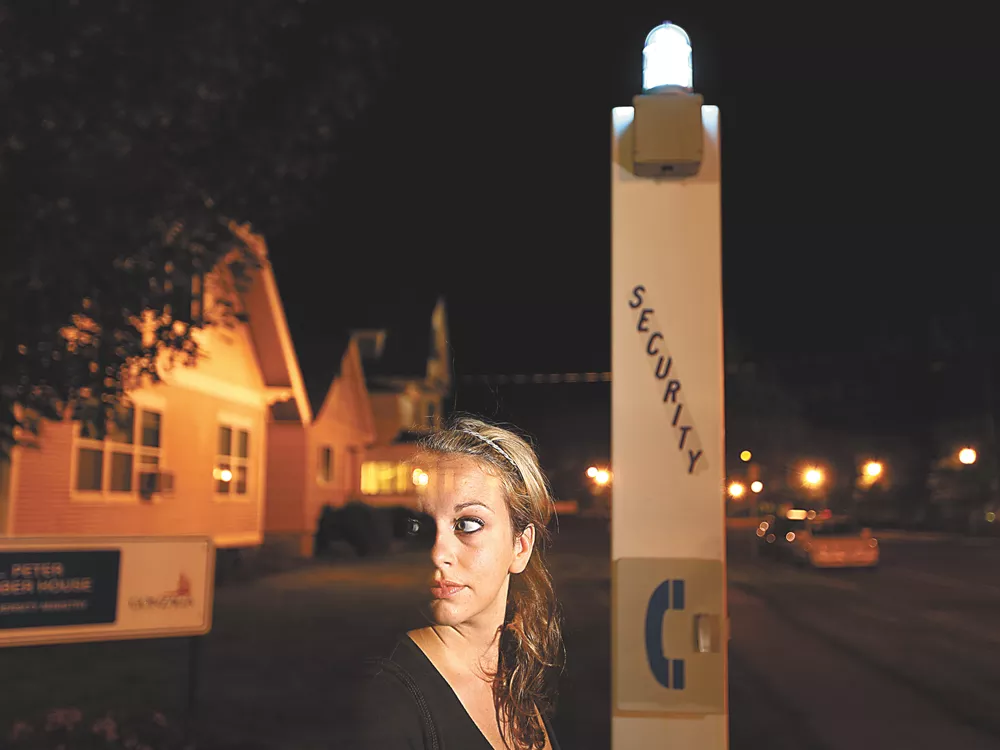“There’s always alcohol involved,” the Moscow Police officer and campus liaison says. “It’s usually in some type of social setting.”
The allure of party culture and the desire to fit in are major drivers of sexual assault on college campuses, according to victim advocates, campus officials and police.
“With the dynamics of the beginning of the year, there’s a lot of vulnerability,” says Emilie McLarnan, the assistant director of Alternatives to Violence on the Palouse, which runs a 24-hour violence hotline and dispatches advocates to hospitals when sexual-assault victims go in for exams after the assault. “People are excited,” McLarnan says. “People are not always the most aware of their surroundings.”
Stories of on-campus sexual assaults have grabbed headlines on college campuses across the country. The Penn State child-sex-abuse scandal highlighted the ability of campus communities to hide assaults. Reed College recently found that its own sexual-assault disciplinary policies were partially out of compliance with federal law. The Portland school is now struggling to
find new policies that satisfy students and administration. Just three hours east of Spokane, the University of Montana in Missoula is floundering to fend off national scrutiny as federal investigators look into accusations that the university and city police inappropriately investigated a series of sexual-assault reports.
Those high-profile instances have led to increased awareness of the complicated process schools go through to investigate and document sexual assaults, and what they’re doing to try to stop them.
Most schools operate under their own codes of conduct and judicial processes to discipline students. Federal laws, including Title IX, mandate that if schools receive reports of sexual assault, they must investigate them, but that doesn’t always involve telling police. While many campuses work with local law enforcement, there is no steadfast requirement that they report all assaults to those agencies. Gonzaga University spokeswoman Mary Joan Hahn says campus security or local police get involved when victims are suffering traumatic injuries or aren’t able to care for themselves. The decision on whether to file a criminal report after an assault has occurred is up to the victim.
The 1990 Jeanne Clery Act mandates that all universities receiving federal financial aid compile annual reports about campus crimes and make them public. In an effort to accurately portray risk, those reports must include all crimes reported on campus, even those that don’t go through a criminal process. If a student reports assault to a teacher or coach, but doesn’t go to the cops, it’s legally required to turn up in the Clery Report.
Bruce Pitman, the dean of students at the University of Idaho, says those guidelines have made campuses more careful about how they address sexual-assault cases and how thoroughly they document their response. But legislation hasn’t been able to stamp out other challenges schools face in finding justice for both accused and accuser.
In many cases there’s not enough evidence for a solid case. Sexual assaults — and not just those on college campuses — are dominated by instances where only two people are present. The victim likely knows the perpetrator. As in all types of sexual assault, it’s often difficult to get victims to come forward, advocates and administrators say. Shame, guilt and social stigma can discourage reporting sexual assault. If victims come to someone associated with the university, that person is required to pass the report along to a higher official, often the dean of students, according to Title IX. That can scare some students away from reporting, says Heather Shea Gasser, director of the University of Idaho’s Women’s Center.
For many, reporting the incident, going through the investigation and, if it gets far enough, facing the ultimate criminal process can be exhausting and traumatic, leading some victims to drop out of school.
In other cases, suspects who have been wrongly accused suffer the trauma and disruption, and that’s led to other types of push-back. In 2006, a high-profile false rape accusation against three members of the Duke University lacrosse team cultivated a national discussion about the damage a false charge of rape can do to the accused.
“This woman has destroyed everything I worked for in my life,” one of the players, David Evans, told 60 Minutes.
In 2010, Dartmouth College faced controversy over the high rate of sexual assaults reported on its campus, so it started a review of its policies. But, earlier this year, after the school held a mock sexual-assault hearing meant to demonstrate what the campus process looks like, students complained that it unfairly favored the accuser.
Even efforts to encourage victims to report have to be handled delicately to avoid assuming the suspect is guilty, says Gasser.
One national campaign to increase reporting of sexual assaults, “Start by Believing,” encourages people to take alleged victims at their word early on so they won’t be scared away from reporting. That approach is important, Gasser says, but it can’t override giving everyone an equal voice in the process.
“We do need to think about everybody’s rights in this scenario,” she says. “We have to make sure both sides have an advocate and have their story heard.”
As awareness of the issue increases, so do campus efforts to try to address and prevent it. One major shift in the movement among advocates and officials is to try to get students who are bystanders, rather than soon-to-be-victims, to do something to stop the assault.
“We want to create a whole campus culture of empowered bystanders who stand up and say, ‘Don’t take that woman up to your room. She’s really intoxicated,’” Gasser says. “We want to be keeping students feeling like this is important, like you have a responsibility instead of just saying, ‘It’s not my problem.’”

















